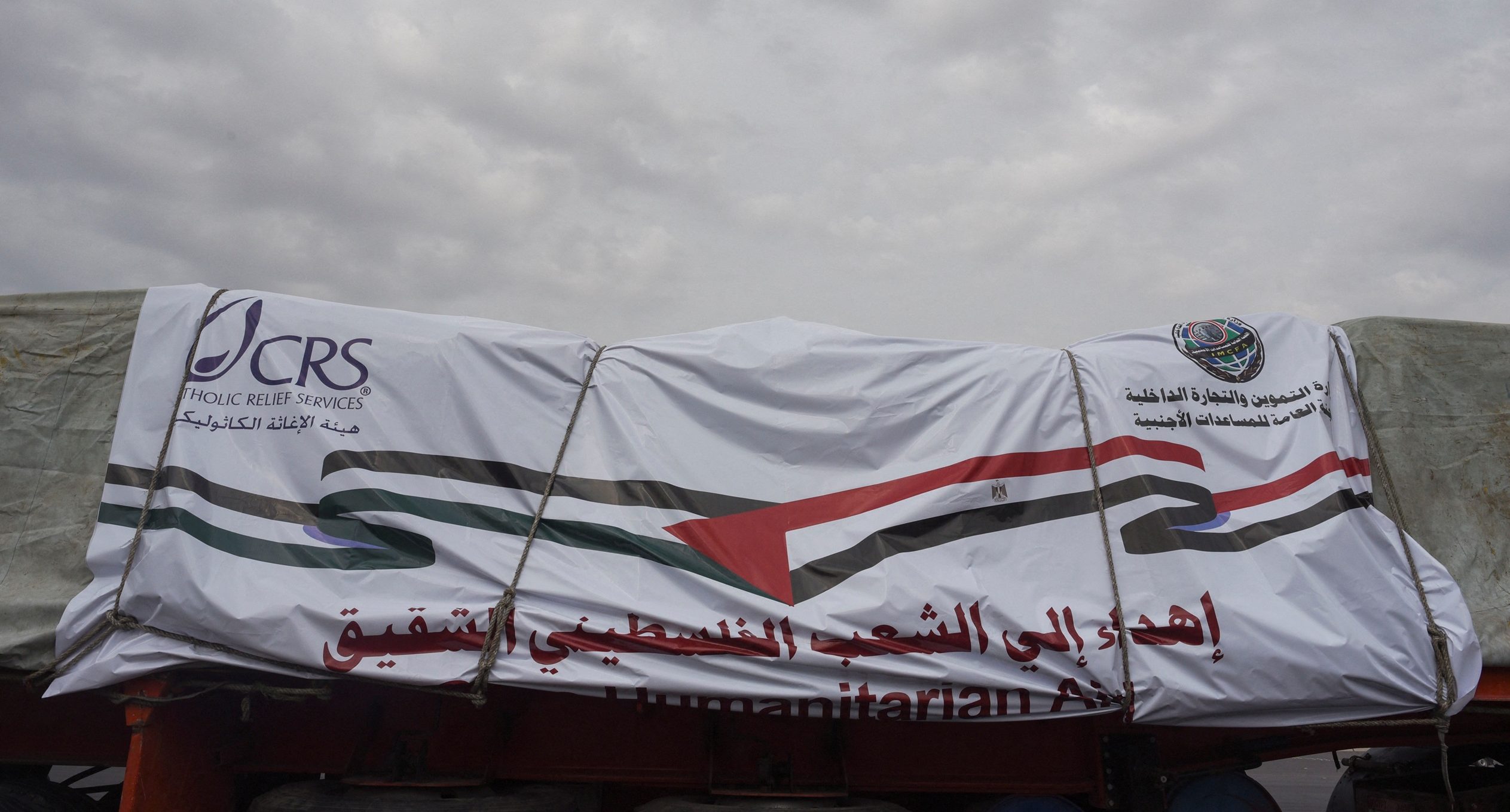Publications
INSS Insight No. 1794, December 6, 2023
Israel’s strategy for post-war Gaza remains ill-defined, but Egypt’s pivotal role in any future development is indisputable. Enhanced coordination between Jerusalem and Cairo is thus vital. Both countries should develop a joint plan to serve their respective political, security, and economic interests, bridge differing visions for Gaza’s future, and integrate regional and international actors into these efforts. The proposed plan should focus on neutralizing Hamas’ military and governance capabilities; facilitating the gradual and conditional reinstatement in the Gaza Strip of a “revitalized Palestinian Authority” committed to peace; strengthening Egyptian oversight over the Philadelphi Route and the Egypt-Sinai border crossings; and crafting an economic incentive package to bolster Egyptian involvement in Gaza.
In the midst of the Israel-Hamas war, known as Swords of Iron, ideas have arisen among Egyptian leaders, state-run media, and research institutes regarding the Gaza Strip’s post-conflict future. Analysis of this discourse indicates Egypt’s disagreement with many of the post-war scenarios considered by Israel regarding the future administrative and military government in the Strip, especially those not linked to a comprehensive resolution of the Palestinian problem. Scenarios debated in Israel include a regime backed by international forces from NATO and the United Nations, one backed by Arab forces, a technocratic government, and the reinstatement of the Palestinian Authority (PA) in Gaza – even without the agreement of Hamas. Egypt, under the current circumstances, is reluctant to assume responsibility for security in Gaza after the war, or to oversee any postbellum government, and is not inclined to participate in any international force deployed in the region.
Egypt also seems to oppose the idea that Israel should achieve all its objectives in the war: defeating Hamas, evading responsibility for governing Gaza, and handing the burden over to regional and international players indefinitely. Moreover, despite Egypt’s stance against using Gaza as a base for terror activities, it rules out any continued post-conflict Israeli military presence in the Strip, whether in the form of full reoccupation, a security zone, or buffers along the border.
Egypt’s reluctance to accept Israel’s ideas is rooted in skepticism about Israel’s desire and ability to decisively defeat Hamas and establish a stable, secure reality in the Strip and along the Gaza-Egypt border. There is also concern that the deployment of Israeli or foreign troops in Gaza could become a long-term, if not permanent, arrangement. Another concern is that a solution for Gaza alone, detached from the broader Palestinian issue, will be considered unjust and would therefore not garner sufficient support among the Palestinian people – thus lacking long-term viability. Finally, Egypt fears that Hamas would do its utmost to delegitimize any alternative Palestinian rule that completely excludes it.
According to media reports, since the war’s onset there has been no contact between Israeli and Egyptian leaders; this disconnect is joined by possible Egyptian resentment over Israel’s increasing reliance on Qatari mediation. Repeated statements by Israeli officials and others have heightened Egyptian concerns about Israel’s alleged plans to forcibly transfer Palestinians from Gaza to Egypt. This scenario – which Prime Minister Benjamin Netanyahu has yet to deny – is perceived by the Egyptian regime and public as an attempt to export the crisis to Egyptian soil, commit a “second nakba,” and resolve the Palestinian issue at Egypt’s expense, compromising Egyptian security and sovereignty. Egyptian Prime Minister Mostafa Madbouly has warned of a “forceful response” to any Israeli attempt to expel Palestinians from Gaza to Egypt, even hinting that Cairo would see this as a breach of the peace treaty between the countries.
The Egyptian Vision for Gaza
To counter Israel’s proposals for the future of the Gaza Strip, Egypt is developing a Palestinian-Arab-regional counterproposal, which aims to prevent the alleged attempts to detach the Gaza problem from the broader Palestinian issue and to solve only its security and humanitarian aspects. The general outlines of Egypt’s plan for the post-war period includes:
- The immediate establishment of a unified and agreed-upon Palestinian leadership in the Gaza Strip and the West Bank. This leadership should be under the Palestinian Authority’s umbrella, would not exclude Hamas entirely, and would enjoy support from Arab states.
- The provision of external financial aid to the Palestinian Authority to reconstruct Gaza and forge a Palestinian consensus around the PA, which would allow it to govern Gaza effectively.
- The resumption of a peace process to provide a concrete roadmap for the resolution of the Israeli-Palestinian conflict, in accordance with United Nations resolutions and the two-state solution.
- Work toward the establishment of a demilitarized Palestinian state, with guarantees from external forces like NATO, the UN, Arab militaries, or the United States.
- The forging of a fortified regional alliance, which includes Israel, aimed at promoting peace, stability, development, and cross-border cooperation.
Currently, it seems that Egypt aims to replicate its pre-October 7 role in Gaza after the war: mediating between Israel and the Palestinians, facilitating discussions between Hamas and Fatah, aiding in Gaza’s reconstruction, and managing the border crossings between Gaza and Sinai for their humanitarian, economic, and security importance.
Common Interests
Alongside the apparent disagreements between Jerusalem and Cairo regarding the post-war reality, the two countries share a long list of common interests, which could lay the foundation for future understandings. Among them are a mutual desire to weaken Hamas and demilitarize the Gaza Strip; establish a stable regime in Gaza to prevent it from becoming a hub for terrorism targeting Israel and Egypt; position Egypt as the main mediator and key actor in forging Gaza’s new reality; curb the influence of the radical “axis of resistance” in the Middle East; and strengthen regional initiatives aimed at peace, stability, and development.

Another shared interest is the desire to leverage the post-war circumstances to improve Egypt’s economic situation and bolster stability. Over the past 18 months, the Egyptian pound has lost about half its value against the US dollar, inflation rates have reached a record high, and more than half of the population is near or below the poverty line. A key element in Egypt’s economic crisis is its growing national debt. According to figures from the Egyptian central bank, the country’s external debt stands at around $165 billion – around 95 percent of GDP – over triple the amount in 2010, prior to the Arab Spring.
The war in the Gaza Strip threatens to exacerbate Egypt’s economic crisis, adding to recent external shocks such as the COVID-19 pandemic and the Russian war in Ukraine. The sectors most likely to be affected hardest are energy, tourism, and international transportation through the Suez Canal. In the initial weeks of the war, Israel’s natural gas exports to Egypt were sharply reduced. The flow of gas was later resumed and has since returned to its pre-war level. Tourism, especially in Sinai, has also experienced a substantial downturn, dropping by dozens of percent during what is typically a peak season for European tourists. Finally, the war poses a threat to international maritime transportation through the Suez Canal, which is a main source of foreign currency for Egypt, due to Houthi targeting of vessels linked to Israel.
Recommendations
To enhance cooperation between Israel and Egypt over the future of the Gaza Strip, both countries need to develop a coordinated strategic plan that bridges the gaps between them. This plan will require support from regional and international allies. Several steps could align their positions more closely.
First, Israel should demonstrate to Egypt its commitment and capability to effectively neutralize Hamas’ governmental and military capabilities. This would ensure that Hamas does not impede the establishment of a new reality in the Gaza Strip, thereby facilitating Cairo’s acceptance of excluding it from future arrangements. Second, Israel should consider favorably Egypt’s expectation that the Palestinian Authority assumes control of the Gaza Strip after the war. Although the PA’s immediate and unconditional return to the Gaza Strip is not feasible, it is vital to develop a framework that details its reinstatement on a set timetable, with reliable guarantees that any interim governance arrangement does not become permanent. Third, Israel should strive to create a political horizon jumpstarting the Israeli-Palestinian peace process when circumstances permit. Finally, the Israeli Prime Minister should unequivocally disavow and distance Israel from any rumored plans to force Gazans out of the Strip, making it clear that such a notion is not under consideration.
As for Egypt, its role in the aftermath of the war should include actions to support the revival of the Israeli-Palestinian peace process, ensuring that Israeli interests are considered. First, Egypt should encourage the PA to accept the demilitarization of the Gaza Strip and undertake trust-building measures with Israel. This includes ceasing incitement in the media, reforming its school curriculum, and halting payments to terrorists and their families. Such measures align with the Biden administration’s goal of creating a “revitalized Palestinian Authority.” Second, if Egypt opposes allowing the Israeli military operational freedom in Gaza, it should propose alternative strategies to safeguard Israel’s national security and help implement them. It could lead or join a temporary Arab taskforce charged with preventing arms smuggling along the Philadelphi Route and through the Egypt-Gaza border crossings. In addition, Egypt should commit to uphold the military appendix to the Israel-Egypt peace treaty.
Regional and international actors can offer further incentive to Egypt to play a constructive role in post-war Gaza, primarily by offering financial incentives, such as foreign investment, loans, and grants. While these incentives are not meant to shift Cairo’s fundamental stance on Gaza's future, which aligns with its own national security interests, they can bolster Egypt’s willingness to engage more deeply, both economically and militarily, in the Strip, and to give greater consideration to Israel’s interests. Key actors in this endeavor include the Gulf states, the United States, and members of the European Union, all of whom share a common interest in de-escalating the Israeli-Palestinian conflict and promoting development, stability, and security in the Middle East.
The incentive package for Egypt can draw some inspiration from Trump’s 2020 peace plan. This plan included investments in energy, tourism, and water infrastructure in Sinai – some of which could also benefit Gaza. In addition, a component of debt forgiveness, akin to the relief Egypt received after the Gulf War for supporting the US-led coalition, could be considered. Egypt’s principal loaners are the International Monetary Fund, the World Bank, the Gulf states, members of the Paris Club, and China. Offering these incentives, coupled with essential economic reforms domestically – which are conditioned by a new IMF loan – has the potential to deliver significant economic and political benefits not only to Egypt but also to Israel, the Palestinians, and the broader region.



